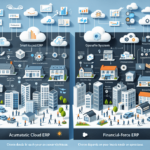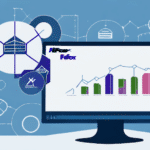Epicor ERP vs Acumatica Cloud ERP: A Comprehensive Comparison
Enterprise Resource Planning (ERP) systems are essential for businesses of all sizes striving to streamline operations, enhance efficiency, and drive growth. Selecting the right ERP system requires careful evaluation of various factors, including features, capabilities, pricing, and customization options. This article compares two leading ERP solutions: Epicor ERP and Acumatica Cloud ERP. We will delve into their key features, advantages, limitations, pricing models, implementation processes, user interfaces, integration capabilities, security measures, and customer support to help you determine which system aligns best with your business needs.
Introduction to ERP Systems
ERP systems integrate various business functions—such as finance, accounting, inventory management, supply chain management, and customer relationship management—into a single platform. These systems enable businesses to automate processes, improve decision-making, and boost productivity and profitability. ERP solutions can be deployed on-premise or in the cloud, each offering distinct advantages depending on the size, complexity, and specific needs of the business.
This comparison focuses on Epicor ERP, an on-premise solution, and Acumatica Cloud ERP, a cloud-based offering. Cloud-based ERPs like Acumatica provide flexibility and scalability, allowing businesses to easily adjust users, modules, and features as needed. Additionally, they offer greater accessibility, enabling remote or distributed teams to access the system from anywhere with an internet connection.
Understanding Epicor ERP
Epicor ERP is a comprehensive business management solution tailored for manufacturing, distribution, retail, and services industries. It offers extensive functionality for managing key business processes, including:
- Financial Management
- Project Management
- Supply Chain Management
- Sales Management
- Inventory Management
- Manufacturing Execution
Key Benefits of Epicor ERP
- Integration Capabilities: Seamlessly connects with other systems and applications, reducing manual data entry and streamlining operations.
- Customization: Offers a range of customization options to tailor the system to specific business needs.
- Scalability: Easily adapts to support the growth and evolving requirements of a business.
- Collaboration: Enhances communication across departments, leading to better decision-making and increased productivity.
Advanced Features
- Human Capital Management: Manages workforce effectively with features like employee onboarding, performance management, and payroll processing.
- Business Intelligence & Analytics: Provides real-time insights into operations, enabling data-driven decisions.
Understanding Acumatica Cloud ERP
Acumatica Cloud ERP is a modern, cloud-based system offering a flexible and scalable solution for managing business operations. It encompasses extensive functionality for:
- Financial Management
- Distribution Management
- Project Accounting
- Customer Management
- Manufacturing
- Field Service Management
Key Benefits of Acumatica Cloud ERP
- Integration: Easily connects with existing software, such as CRM and e-commerce platforms, ensuring a seamless flow of data across the organization.
- Mobile Accessibility: Offers a mobile app that allows users to access the system from smartphones or tablets, enhancing productivity on-the-go.
- User-Friendly Interface: Features intuitive dashboards and adaptable workflows, making customization straightforward without the need for extensive coding.
- Security: Implements advanced security measures like role-based access control and data encryption to protect sensitive information.
Advanced Features
- Robust Reporting & Analytics: Customizable dashboards and real-time data provide valuable insights for informed decision-making.
- Scalability: Suitable for businesses of all sizes, allowing for easy expansion and adaptation to changing market conditions.
Key Features of Epicor ERP
- Financial Management
- Supply Chain Management
- Manufacturing Execution System
- Product Lifecycle Management
- Customer Relationship Management
- Sales Management
- Inventory Management
- Project Management
Additional Features
- Human Capital Management
- Business Intelligence and Analytics
The Human Capital Management feature allows businesses to manage their workforce effectively, including employee onboarding, performance management, and payroll processing. The Business Intelligence and Analytics feature offers real-time insights into operations, enabling data-driven decisions.
Key Features of Acumatica Cloud ERP
- Financial Management
- Distribution Management
- Customer Management
- Project Accounting
- Inventory Management
- Manufacturing
- Field Service Management
- Service Management
Additional Features
- Robust Reporting and Analytics
- Mobile Accessibility
Acumatica Cloud ERP provides robust reporting and analytics capabilities with customizable dashboards and real-time data. Its mobile app ensures that users can access critical information and perform tasks from anywhere, enhancing flexibility and responsiveness.
Advantages of Using Epicor ERP
- Comprehensive functionality covering various business processes
- Flexible system architecture supporting customization
- Real-time visibility and insights into operations
- Customizable workflows and dashboards
- Advanced reporting and analytics capabilities
- Multi-language and multi-currency support for global operations
- Seamless integration with other systems like CRM and supply chain management software
- User-friendly interface reducing the need for extensive training
Advantages of Using Acumatica Cloud ERP
- Cloud-based solution offering scalability and flexibility
- User-friendly interface with intuitive navigation
- Adaptable workflows and dashboards for customization
- Strong mobile functionality for remote access
- Seamless integration with other software systems
- Advanced security features, including role-based access and data encryption
Acumatica's integration capabilities eliminate data silos and enhance overall efficiency by ensuring seamless data transfer between different software solutions.
Limitations and Drawbacks of Epicor ERP
- Difficult and expensive implementation process
- Poor customer support with slow response times
- Outdated and less intuitive user interface
- Expensive licensing costs
- Lack of flexibility for unique business needs
- Limited customization options
- Slow performance and frequent system crashes
These limitations can lead to significant downtime and lost productivity, making Epicor ERP less suitable for businesses requiring highly tailored and reliable solutions.
Limitations and Drawbacks of Acumatica Cloud ERP
- Some complex features and customization options are limited
- Limited reporting and analytics functionality compared to competitors
- Less established user base
- Integration with third-party software may require additional development
Despite these drawbacks, Acumatica Cloud ERP offers several benefits, such as scalability, mobile accessibility, multi-currency and multi-language support, and robust security features. Businesses should carefully evaluate their specific needs and requirements before selecting Acumatica as their ERP solution.
Pricing Comparison: Epicor vs Acumatica
The pricing for Epicor ERP and Acumatica Cloud ERP varies based on the size and complexity of the business:
- Epicor ERP: Typically charges a per-user license fee ranging from $1,500 to $5,000 per user.
- Acumatica Cloud ERP: Uses a subscription-based model starting at $10,000 per year, scaling with the size of the business.
Epicor ERP may have a higher upfront cost due to the per-user license fees, but it offers a variety of modules and add-ons that can be customized to fit specific business needs. In contrast, Acumatica Cloud ERP provides a more all-inclusive package with its subscription model, which can be more cost-effective for smaller businesses with less complex requirements.
Both vendors offer discounts for multi-year contracts and larger user bases. It is crucial for businesses to evaluate their needs and budgets carefully and negotiate with vendors to secure the best possible pricing and packages.
Implementation and Customization Options
Epicor ERP
Epicor ERP requires significant implementation time and effort, making it an expensive option for some businesses. Customization options are available but demand specialized knowledge and may incur additional costs.
Acumatica Cloud ERP
Acumatica Cloud ERP offers a more straightforward implementation process with customizable workflows and dashboards that are easy to adapt to business needs. Users can create custom reports and add new fields without requiring coding expertise.
User Interface Comparison: Epicor vs Acumatica
The user interface of an ERP system significantly impacts usability and user adoption:
- Epicor ERP: Features an interface that some users find outdated and less intuitive compared to modern cloud-based ERPs.
- Acumatica Cloud ERP: Boasts a sleek, modern interface with customizable dashboards, allowing users to access information quickly and efficiently.
Integration Capabilities: Epicor vs Acumatica
Integration capabilities are vital for ensuring seamless operations across various business systems:
- Epicor ERP: Offers extensive integration options but may require additional development work to connect with certain third-party software.
- Acumatica Cloud ERP: Provides open APIs that facilitate seamless integration with other software solutions, including CRM, HR, and e-commerce platforms.
These integration capabilities help eliminate data silos and improve overall business efficiency.
Security Features Comparison: Epicor vs Acumatica
Both Epicor ERP and Acumatica Cloud ERP prioritize data security with robust features:
- Data Encryption
- Role-Based Access Control
- Multi-Factor Authentication
These security measures ensure that sensitive information is protected from unauthorized access and potential breaches.
Customer Support Comparison: Epicor vs Acumatica
Customer support quality can greatly impact the ERP experience:
- Epicor ERP: Has faced criticism for slow response times and a lack of expertise in their support team.
- Acumatica Cloud ERP: Offers a robust online community, extensive training resources, and a responsive customer support team, enhancing user satisfaction and system utilization.
Which System is Best Suited for Your Business Needs?
The decision between Epicor ERP and Acumatica Cloud ERP hinges on several factors, including:
- Business Size and Growth: Epicor is suitable for established companies with complex processes, while Acumatica caters well to small and midsize businesses seeking flexibility and scalability.
- Deployment Preferences: Choose Epicor for on-premise solutions or Acumatica for cloud-based deployment.
- Budget Considerations: Evaluate the total cost of ownership, including licensing, implementation, and customization expenses.
- Customization and Integration Needs: Determine the level of customization and integration required with existing systems.
Ultimately, the best ERP system aligns with your business's specific requirements, growth plans, and budget constraints.
Conclusion: Final Thoughts on Epicor vs Acumatica ERP
Both Epicor ERP and Acumatica Cloud ERP are powerful solutions offering extensive functionality and robust security features. Your choice should be guided by the size, needs, and budget of your business. Investing in an ERP system is a critical step toward achieving operational efficiency, enhancing productivity, and driving sustainable growth. By carefully evaluating the strengths and limitations of each platform, you can select the ERP solution that best supports your business objectives.




















